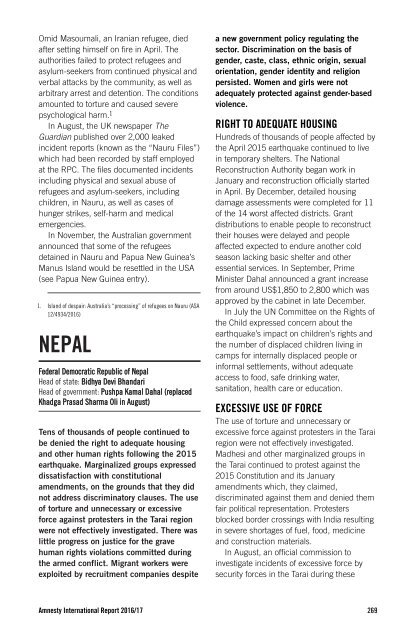AMNESTY INTERNATIONAL REPORT 2016/17
2lEHU9j
2lEHU9j
You also want an ePaper? Increase the reach of your titles
YUMPU automatically turns print PDFs into web optimized ePapers that Google loves.
Omid Masoumali, an Iranian refugee, died<br />
after setting himself on fire in April. The<br />
authorities failed to protect refugees and<br />
asylum-seekers from continued physical and<br />
verbal attacks by the community, as well as<br />
arbitrary arrest and detention. The conditions<br />
amounted to torture and caused severe<br />
psychological harm. 1<br />
In August, the UK newspaper The<br />
Guardian published over 2,000 leaked<br />
incident reports (known as the “Nauru Files”)<br />
which had been recorded by staff employed<br />
at the RPC. The files documented incidents<br />
including physical and sexual abuse of<br />
refugees and asylum-seekers, including<br />
children, in Nauru, as well as cases of<br />
hunger strikes, self-harm and medical<br />
emergencies.<br />
In November, the Australian government<br />
announced that some of the refugees<br />
detained in Nauru and Papua New Guinea’s<br />
Manus Island would be resettled in the USA<br />
(see Papua New Guinea entry).<br />
1. Island of despair: Australia’s “processing” of refugees on Nauru (ASA<br />
12/4934/<strong>2016</strong>)<br />
NEPAL<br />
Federal Democratic Republic of Nepal<br />
Head of state: Bidhya Devi Bhandari<br />
Head of government: Pushpa Kamal Dahal (replaced<br />
Khadga Prasad Sharma Oli in August)<br />
Tens of thousands of people continued to<br />
be denied the right to adequate housing<br />
and other human rights following the 2015<br />
earthquake. Marginalized groups expressed<br />
dissatisfaction with constitutional<br />
amendments, on the grounds that they did<br />
not address discriminatory clauses. The use<br />
of torture and unnecessary or excessive<br />
force against protesters in the Tarai region<br />
were not effectively investigated. There was<br />
little progress on justice for the grave<br />
human rights violations committed during<br />
the armed conflict. Migrant workers were<br />
exploited by recruitment companies despite<br />
a new government policy regulating the<br />
sector. Discrimination on the basis of<br />
gender, caste, class, ethnic origin, sexual<br />
orientation, gender identity and religion<br />
persisted. Women and girls were not<br />
adequately protected against gender-based<br />
violence.<br />
RIGHT TO ADEQUATE HOUSING<br />
Hundreds of thousands of people affected by<br />
the April 2015 earthquake continued to live<br />
in temporary shelters. The National<br />
Reconstruction Authority began work in<br />
January and reconstruction officially started<br />
in April. By December, detailed housing<br />
damage assessments were completed for 11<br />
of the 14 worst affected districts. Grant<br />
distributions to enable people to reconstruct<br />
their houses were delayed and people<br />
affected expected to endure another cold<br />
season lacking basic shelter and other<br />
essential services. In September, Prime<br />
Minister Dahal announced a grant increase<br />
from around US$1,850 to 2,800 which was<br />
approved by the cabinet in late December.<br />
In July the UN Committee on the Rights of<br />
the Child expressed concern about the<br />
earthquake’s impact on children’s rights and<br />
the number of displaced children living in<br />
camps for internally displaced people or<br />
informal settlements, without adequate<br />
access to food, safe drinking water,<br />
sanitation, health care or education.<br />
EXCESSIVE USE OF FORCE<br />
The use of torture and unnecessary or<br />
excessive force against protesters in the Tarai<br />
region were not effectively investigated.<br />
Madhesi and other marginalized groups in<br />
the Tarai continued to protest against the<br />
2015 Constitution and its January<br />
amendments which, they claimed,<br />
discriminated against them and denied them<br />
fair political representation. Protesters<br />
blocked border crossings with India resulting<br />
in severe shortages of fuel, food, medicine<br />
and construction materials.<br />
In August, an official commission to<br />
investigate incidents of excessive force by<br />
security forces in the Tarai during these<br />
Amnesty International Report <strong>2016</strong>/<strong>17</strong> 269


